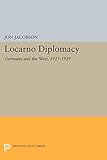Locarno Diplomacy : Germany and the West, 1925-1929 / Jon Jacobson.
Material type: TextSeries: Princeton Legacy Library ; 1487Publisher: Princeton, NJ : Princeton University Press, [2015]Copyright date: ©1972Description: 1 online resource (434 p.)Content type:
TextSeries: Princeton Legacy Library ; 1487Publisher: Princeton, NJ : Princeton University Press, [2015]Copyright date: ©1972Description: 1 online resource (434 p.)Content type: - 9780691620015
- 9781400869619
- 327.43
- DD240
- online - DeGruyter
- Issued also in print.
| Item type | Current library | Call number | URL | Status | Notes | Barcode | |
|---|---|---|---|---|---|---|---|
 eBook
eBook
|
Biblioteca "Angelicum" Pont. Univ. S.Tommaso d'Aquino Nuvola online | online - DeGruyter (Browse shelf(Opens below)) | Online access | Not for loan (Accesso limitato) | Accesso per gli utenti autorizzati / Access for authorized users | (dgr)9781400869619 |
Browsing Biblioteca "Angelicum" Pont. Univ. S.Tommaso d'Aquino shelves, Shelving location: Nuvola online Close shelf browser (Hides shelf browser)

|

|

|

|

|

|

|
||
| online - DeGruyter Revolt in Athens : The Greek Communist "Second Round," 1944-1945 / | online - DeGruyter The Silent Revolution : Changing Values and Political Styles Among Western Publics / | online - DeGruyter The Existentialist Critique of Freud : The Crisis of Autonomy / | online - DeGruyter Locarno Diplomacy : Germany and the West, 1925-1929 / | online - DeGruyter Money and Capital Markets in Postbellum America / | online - DeGruyter Poetry and Courtliness in Renaissance England / | online - DeGruyter Ideology, Reason, and the Limitation of War : Religious and Secular Concepts, 1200-1740 / |
Frontmatter -- Preface -- Contents -- Part One. The Making of Locarno -- Abbreviations and Designations -- 1. Stresemann and the Practice of German Revisionism -- 2. England Between Victor and Vanquished -- 3. The Security of France and Her Allies -- 4. Three Images of Locarno -- Part Two. Appeasement Before and After Locarno 1925-1926 -- 1. Security, Disarmament, and the Rhineland before -- 2. The Locarno Bargain, October 5-December I, 1925 -- 3. The League Council Crisis and the Beginning of Locarno Diplomacy, March 1926 -- 4. The Military Occupation of Germany and the Treaty of Berlin, January-August 1926 -- 5. Allied Withdrawal from the Rhine? The Thoiry Conversation, September-October 1926 -- 6. Permanent Surveillance of Germany and the End of Military Control, November-December 1926 -- Part Three. The Decline of the Spirit of Locarno 1927 -- 1. Briand's Retreat From Thoiry, December 1926-February 1927 -- 2. French Rhine Policy In 1927: Occupation And Security -- 3. The Crisis Of Franco-German Relations And The Personal Estrangement Between Stresemann And Briand, March-May 192J -- 4. Chamberlain And The Entente: The Rhineland, Russia, And "The Anglo-French Thoiry" Of May 18, 192J -- 5. Germany Between East And West June 1927 -- Part Four. Freedom for the Rhineland January-July 1928 -- 1. The German Offensive on Evacuation: The Winter Debate, January-February 1928 -- 2. Evacuation and Security -- 3. The Price of Freedom: Gilbert, Poincare, and the Origins of the Young Plan, January-April 1928 -- 4. The Miiller Government and the Evacuation of Coblenz, April-July 1928 -- 5. The End of Locarnite Collaboration? The German Denkschrift of July 20, 1928 -- Part Five. Compensation for the Allies August-December 1928 -- 1. The Disarmament Compromise and the Opening of the Rhineland Question, August-September 1928 -- 2. The Entente and the Reparation Invoice October-November 13, 1928 -- 3. Evacuation Without Compensation and the Surge of Anti-Locarno Feeling in Germany, November 13. December 1928 -- Part Six. The Final Reparation Settlement January-June 1929 -- 1. The Politics of Disappointment, January-April 1929 -- 2. The Young Conference, February 11-April 17, 1929 -- 3. Germany Accepts the Young Plan April 19-May 3, 1929 -- 4. An Analysis of the Plan -- Part Seven. "The Final Liquidation of the War" June-July 1929 -- 1. A New Course for British Policy: The Second Labour Government -- 2. Stresemann and the Return of the Saar -- 3. French Military Security: The Commission of Verification -- 4. Financial Security for France: Ratification of the War Debt Agreements and Advance Reparation Payment -- Part Eight. The First Hague Conference August 1929 -- 1. The Break in the Entente, August 6-11 -- 2. The Locarno Powers Divided, August 13-21 -- 3. The End of Control over the Demilitarized Zone -- 4. The Modification of the Young Plan, August 16-31 -- 5. The Settlement of 1929 -- Part Nine. Conclusion -- 1. The End of an Era -- 2. The Legacy of 1929 -- 3. The Locarno Era -- Bibliography -- Index
restricted access online access with authorization star
http://purl.org/coar/access_right/c_16ec
The Locarno Conference of 1925 and the five treaties concluded there have been seen as the turning point of the interwar years, i.e., Germany's acceptance of the 1919 peace settlement and the beginning of a new era of peace. Studying the documentary evidence, much of it available only recently, Jon Jacobson explores the personalities and politics of Locarno and offers a historical interpretation and synthesis of a critical decade in European diplomacy.Originally published in 1972.The Princeton Legacy Library uses the latest print-on-demand technology to again make available previously out-of-print books from the distinguished backlist of Princeton University Press. These editions preserve the original texts of these important books while presenting them in durable paperback and hardcover editions. The goal of the Princeton Legacy Library is to vastly increase access to the rich scholarly heritage found in the thousands of books published by Princeton University Press since its founding in 1905.
Issued also in print.
Mode of access: Internet via World Wide Web.
In English.
Description based on online resource; title from PDF title page (publisher's Web site, viewed 30. Aug 2021)


